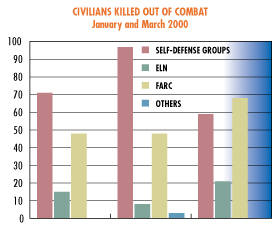
 Source: Army Command.
Source: Army Command.
A total of 425 civilians were killed between January and March 2000. 196 of them fell victims to guerrilla groups and 227 to self-defense groups. Two persons were killed in the crossfire between guerrillas and members of self-defense groups. |
According to information provided by the non-governmental organization: Center for Research and Popular Education, CINEP, on infringements of International Humanitarian Law in 1999, self-defense groups committed 74% of homicides of protected persons, and are responsible for 85% of the cases of torture. In other words, most of these infringements are attributed to them. The guerrillas are responsible for 98% of hostage-takings, 77% of threats, 75% of cases of forced recruitment, and 70% of cases involving injuries to people. In the context of the war, the Military Forces and the Police are held responsible for 12% of cases involving injuries to people, 7% of cases of torture, and 2 % of homicides of protected persons.
General Army Command figures relating to violations of the rights to life and physical integrity of persons over the past three years, show a growing trend in the number of infringements of international humanitarian law committed by self-defense groups. This also applies to the guerrillas, although their participation in this kind of actions had slightly decreased in 1998. The FARC commit the largest number of infringements of international humanitarian law.
With regard to homicide as an infringement
of international humanitarian law, the General Army Command recorded twenty
cases of death in combat of protected persons in 1999. Protected persons
include persons taking no active part in the hostilities, including members
of the Armed Forces who have laid down their arms, and those placed hors
de combat by a diversity of circumstances. Guerrilla and self-defense groups
have perpetrated these crimes on a large scale.
 Source: CINEP - Justice and
Peace’s data bank
Source: CINEP - Justice and
Peace’s data bank
Processed by: Observatory on Human Rights in Colombia, Office of the Vicepresident of the Republic of Colombia. |
Other infringements of international
humanitarian law include the killing of civilians outside of combat, but
within the context of the armed conflict. In 1999 the Army recorded 1,561
victims whose cases constitute summary and extrajudicial executions carried
out by armed parties to the conflict. The figure for January to March 2000
is 425. Subversive groups murder civilians, who they select either for
their alleged links with self-defense groups or the military, or for failing
to satisfy their demands. Another practice is the so-called summary execution,
frequently committed against those who provide supplies to the military
or to self-defense groups, or those who would not meet demands made to
them. The guerrillas and self-defense groups commit massacres of civilians
as war practices. It is worth pointing out that the strategy employed by
self-defense groups is based on attacks on the civilian population.

Source: Army Command. Processed by: Observatory on Human Rights in Colombia, Office of the Vicepresident of the Republic of Colombia. |